介词(表格)
初中英语介词用法总结与归纳
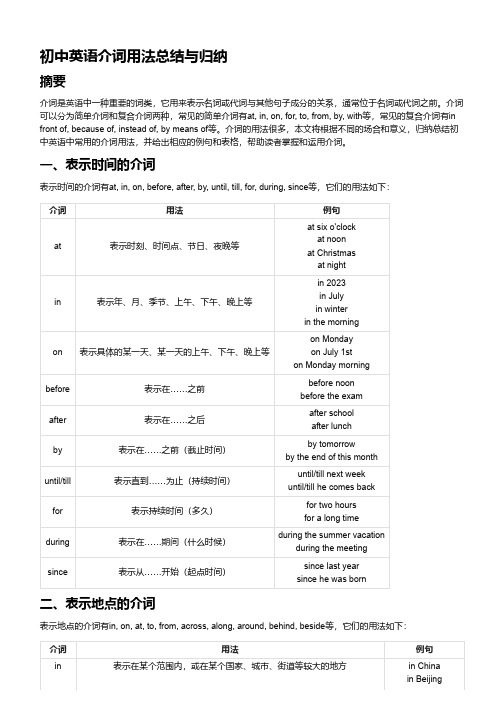
初中英语介词用法总结与归纳摘要介词是英语中一种重要的词类,它用来表示名词或代词与其他句子成分的关系,通常位于名词或代词之前。
介词可以分为简单介词和复合介词两种,常见的简单介词有at, in, on, for, to, from, by, with等,常见的复合介词有in front of, because of, instead of, by means of等。
介词的用法很多,本文将根据不同的场合和意义,归纳总结初中英语中常用的介词用法,并给出相应的例句和表格,帮助读者掌握和运用介词。
一、表示时间的介词表示时间的介词有at, in, on, before, after, by, until, till, for, during, since等,它们的用法如下:介词用法例句at表示时刻、时间点、节日、夜晚等at six o'clock at noonat Christmas at nightin表示年、月、季节、上午、下午、晚上等in 2023in Julyin winterin the morningon表示具体的某一天、某一天的上午、下午、晚上等on Mondayon July 1ston Monday morningbefore表示在……之前before noon before the examafter表示在……之后after school after lunchby表示在……之前(截止时间)by tomorrowby the end of this monthuntil/till表示直到……为止(持续时间)until/till next week until/till he comes backfor表示持续时间(多久)for two hours for a long timeduring表示在……期间(什么时候)during the summer vacation during the meetingsince表示从……开始(起点时间)since last year since he was born二、表示地点的介词表示地点的介词有in, on, at, to, from, across, along, around, behind, beside等,它们的用法如下:介词用法例句in表示在某个范围内,或在某个国家、城市、街道等较大的地方in Chinain Beijing介词用法例句in ZhongshanRoadon表示在某个表面上,或在某个楼层、台阶等较小的地方,或在某个方位上on the wall on the secondflooron the left/rightat 表示在某个具体的位置或地点,或在某个机构、场所等较小的地方,或表示靠近、附近等at the cornerat schoolat the bus stopto表示朝向某个方向或地点,或表示到达某个地点(范围之外)to the east to Japan to schoolfrom表示从某个地点出发或离开(范围之外)from home from Shanghai from Chinaacross表示横穿或穿过(从一边到另一边)across the street across the riveralong表示沿着或顺着(在一边)along the road along the riveraround表示围绕或环绕(在四周)around the lake around the worldbehind表示在……后面behind the door behind himbeside表示在……旁边beside the window beside her三、表示方向的介词表示方向的介词有to, from, into, out of, onto, off, up, down, through等,它们的用法如下:介词用法例句to表示朝向某个方向或地点,或表示目的地He is going to Beijing. She gave the book to me.from表示从某个方向或地点出发或离开,或表示来源He came from the south. This is a gift from my friend.into表示进入某个范围或空间(由外到内)He jumped into the water. She put the flowers into the vase.out of表示离开某个范围或空间(由内到外)He ran out of the room. She took the book out of the bag.onto表示移动到某个表面上(由低到高)He climbed onto the roof. She threw the ball onto the ground.off表示从某个表面上移开(由高到低)He fell off the bike. She took off her hat.up表示向上移动(由低到高)He went up the hill.介词用法例句She climbed up the ladder.down表示向下移动(由高到低)He came down the stairs. She slid down the slide.through表示穿过某个空间或物体(从一端到另一端)He walked through the forest. She looked through the window.四、表示方式、手段、工具的介词表示方式、手段、工具的介词有by, with, in, on等,它们的用法如下:介词用法例句by 表示交通工具、方式、方法等,或表示被动语态的动作执行者,或表示时间的截止点,或表示计量单位等by busby mistakeby himby tomorrowby weightwith 表示使用某种工具、器具、材料等,或表示伴随的人或物,或表示具有某种特征、状态等,或表示原因、理由等with a knifewith hisparentswith long hairwith joyin 表示使用某种语言、文字、颜色等,或表示穿着某种衣服,或表示处于某种状态、情况等,或表示在某种范围内等in Englishin black andwhitein a red dressin a hurryin generalon 表示使用某种电子设备、媒体等,或表示依靠某种力量、条件等,或表示以某种方式等,或表示参与某种活动等on TVon footon fireon dutyon holiday五、表示原因、目的、结果的介词表示原因、目的、结果的介词有for, at, from, of, with, by, because of, owing to, thanks to, out of, through等,它们的用法如下:介词用法例句for 表示原因、理由,常与sorry, famous, punish, praise, thank, blame等连用,也表示目的、意图,常与hope, wish, wait, look, come, go等连用,也可以表示用途、功能等for peacefor helpfor a walkfor funfor cutting paperat表示目的、意图,常与surprised, shocked, amazed, good, bad等连用,也可以表示针对、针对性等at his words at the news at math介词用法例句at solvingproblemsfrom 表示结果、效果,常与different, far, free, safe等连用,也可以表示来源、出发点等from the picturefrom now onfrom dangerfrom birthof 表示原因、理由,常与afraid, proud, sure, tired等连用,也可以表示所属、属性、特征等of the darkof himof the resultof his workwith 表示原因、理由,常与pleased, satisfied, angry, happy等连用,也可以表示伴随、方式、工具等with the answerwith himwith a smilewith a knifeby 表示方式、方法、手段等,也可以表示被动语态的动作执行者,或表示时间的截止点,或表示计量单位等by doing thisby himby tomorrowby weightbecauseof 表示原因、理由,相当于一个从句,后面接名词或代词等because of therainbecause of thatowing to表示原因、理由,相当于一个从句,后面接名词或代词等owing to the trafficjamowing to hisillnessthanks to表示原因、理由,含有感激或讽刺的意味,后面接名词或代词等thanks to yourhelp thanks to his carelessnessout of表示原因、理由,含有出于某种动机或感情的意味,后面接名词或代词等out of curiosity out of pitythrough表示原因、理由,含有经过某种过程或方式的意味,后面接名词或代词等through hard work through a window六、表示对象、范围的介词表示对象、范围的介词有of, for, about, with, to, from, among, between等,它们的用法如下:介词用法例句of表示所属、属性、特征等,也可以表示分离、脱离等the color of the skya cup of teaa friend of mineget rid of itfor表示目标、对象、受益者等,也可以表示目的、原因等 a gift for youa seat for twoa doctor for the poora room for rentabout表示主题、内容、话题等,也可以表示大约、左右等a book about history tell me about yourself about ten minuteswith表示伴随、陪同等,也可以表示方式、工具等stay with mea man with glasses speak with a loud voice cut it with a knifeto表示方向、目的地等,也可以表示对象、接受者等go to school fly to London say hello to him give it to herfrom表示来源、出发点等,也可以表示对象、对比者等come from Chinaa letter from my father different from youlearn from himamong表示在三个或三个以上的人或物之间(内部)share it among yourselves a flower among the grassbetween表示在两个人或物之间(内部或外部)sit between thema river between two mountains七、其他常用的介词除了上述介词外,还有一些其他常用的介词,如as, like, except, without, beyond, above, below, over, under等,它们的用法如下:介词用法例句as表示身份、职业、角色等,也可以表示方式、方法、程度等as a teacher as usual as you know as well aslike表示相似、类似等,也可以表示喜欢、喜爱等like a birdlike father, like sonI like music.except表示除……之外(不包括)everyone except me every day except Sundaywithout表示没有、缺少等without money without water without a wordbeyond表示超出、超过等beyond the wall beyond my expectation beyond controlabove表示在……之上(不接触)above the ground above sea levelabove allbelow表示在……之下(不接触)below the surface below zero below averageover表示在……之上(覆盖或接触)over the bridge over his head over the phoneunder表示在……之下(覆盖或接触)under the tree under his arm under the weather。
介词大全
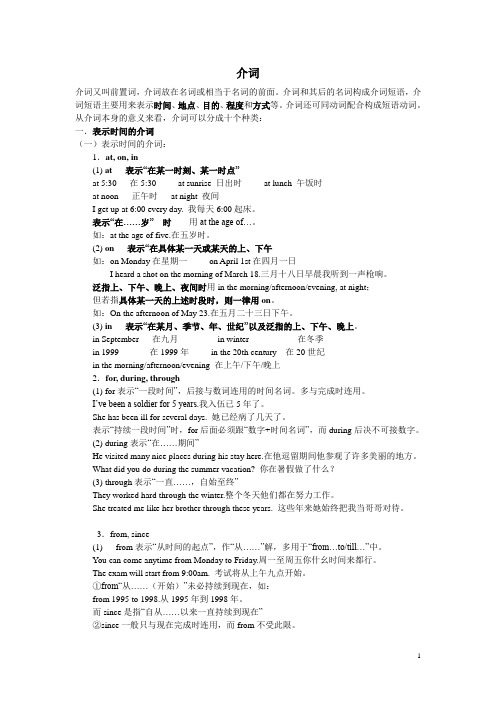
介词介词又叫前置词,介词放在名词或相当于名词的前面。
介词和其后的名词构成介词短语,介词短语主要用来表示时间、地点、目的、程度和方式等。
介词还可同动词配合构成短语动词。
从介词本身的意义来看,介词可以分成十个种类:一.表示时间的介词(一)表示时间的介词:1.at, on, in(1) at 表示“在某一时刻、某一时点”at 5:30在5:30at sunrise 日出时at lunch 午饭时at noon正午时at night 夜间I get up at 6:00 every day. 我每天6:00起床。
表示“在……岁”时用at the age of…。
如:at the age of five.在五岁时。
(2) on 表示“在具体某一天或某天的上、下午如:on Monday在星期一on April 1st在四月一日I heard a shot on the morning of March 18.三月十八日早晨我听到一声枪响。
泛指上、下午、晚上、夜间时用in the morning/afternoon/evening, at night;但若指具体某一天的上述时段时,则一律用on。
如:On the afternoon of May 23.在五月二十三日下午。
(3) in 表示“在某月、季节、年、世纪”以及泛指的上、下午、晚上。
in September在九月in winter在冬季in 1999 在1999年in the 20th century在20世纪in the morning/afternoon/evening 在上午/下午/晚上2.for, during, through(1) for表示“一段时间”,后接与数词连用的时间名词。
多与完成时连用。
I’ve been a soldier for 5 years.我入伍已5年了。
She has been ill for several days. 她已经病了几天了。
小学英语介词总结
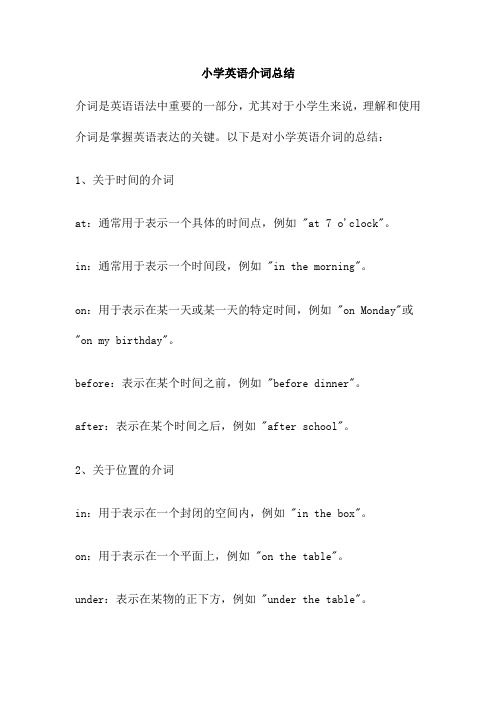
小学英语介词总结介词是英语语法中重要的一部分,尤其对于小学生来说,理解和使用介词是掌握英语表达的关键。
以下是对小学英语介词的总结:1、关于时间的介词at:通常用于表示一个具体的时间点,例如 "at 7 o'clock"。
in:通常用于表示一个时间段,例如 "in the morning"。
on:用于表示在某一天或某一天的特定时间,例如 "on Monday"或"on my birthday"。
before:表示在某个时间之前,例如 "before dinner"。
after:表示在某个时间之后,例如 "after school"。
2、关于位置的介词in:用于表示在一个封闭的空间内,例如 "in the box"。
on:用于表示在一个平面上,例如 "on the table"。
under:表示在某物的正下方,例如 "under the table"。
above:表示在某物的上方,但是不一定是正上方,例如 "above the table"。
beside:表示在某物的旁边,例如 "beside the book"。
3、关于方向的介词to:用于表示朝向某个方向或地点,例如 "go to school"。
from:用于表示从一个地方或位置到另一个地方或位置,例如 "come from school"。
towards:表示朝向某个方向或地点,但是不一定到达那里,例如"walk towards the park"。
4、关于原因的介词because:用于表示原因或理由,例如 "I am late because I missed the bus"。
语法:常用介词汇总(by,for,at,with,from,of,about,after,in,on,to)
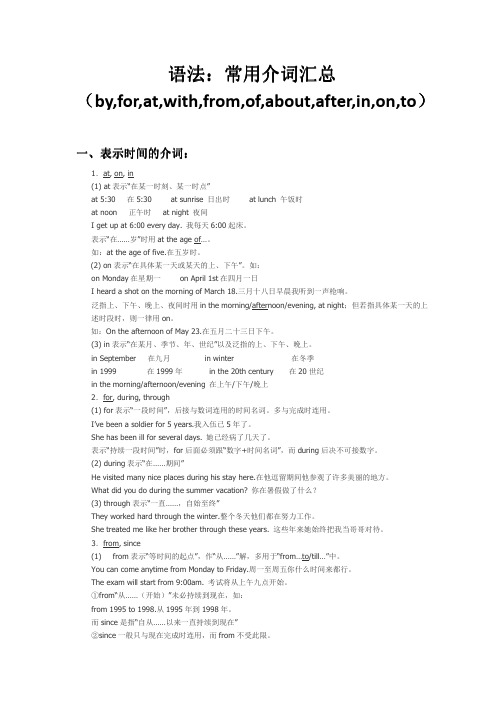
语法语法::常用介词汇总(by,for,at,with,from,of,about,after,in,on,to )一、表示时间的介词表示时间的介词::1.at, on, in(1) at 表示“在某一时刻、某一时点”at 5:30 在5:30 at sunrise 日出时 at lunch 午饭时at noon 正午时 at night 夜间I get up at 6:00 every day. 我每天6:00起床。
表示“在……岁”时用at the age of…。
如:at the age of five.在五岁时。
(2) on 表示“在具体某一天或某天的上、下午”。
如:on Monday 在星期一 on April 1st 在四月一日I heard a shot on the morning of March 18.三月十八日早晨我听到一声枪响。
泛指上、下午、晚上、夜间时用in the morning/afternoon/evening, at night ;但若指具体某一天的上述时段时,则一律用on 。
如:On the afternoon of May 23.在五月二十三日下午。
(3) in 表示“在某月、季节、年、世纪”以及泛指的上、下午、晚上。
in September 在九月 in winter 在冬季in 1999 在1999年 in the 20th century 在20世纪in the morning/afternoon/evening 在上午/下午/晚上2.for, during, through(1) for 表示“一段时间”,后接与数词连用的时间名词。
多与完成时连用。
I’ve been a soldier for 5 years.我入伍已5年了。
She has been ill for several days. 她已经病了几天了。
表示“持续一段时间”时,for 后面必须跟“数字+时间名词”,而during 后决不可接数字。
常用介词用法简表
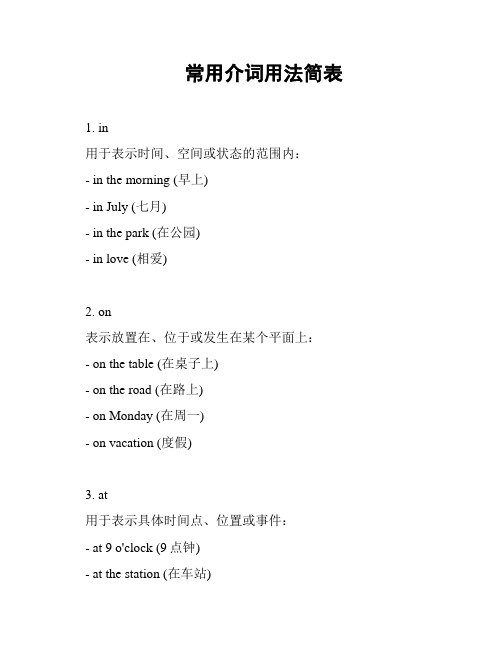
常用介词用法简表1. in用于表示时间、空间或状态的范围内:- in the morning (早上)- in July (七月)- in the park (在公园)- in love (相爱)2. on表示放置在、位于或发生在某个平面上:- on the table (在桌子上)- on the road (在路上)- on Monday (在周一)- on vacation (度假)3. at用于表示具体时间点、位置或事件:- at 9 o'clock (9点钟)- at the station (在车站)- at a party (在派对上)- at the meeting (在会议上)4. from表示起始点、来源或关系:- from London (来自伦敦)- from Monday to Friday (从周一到周五) - from my perspective (从我的角度来看) - from my experience (从我的经验来说)5. to/into表示方向或运动目的地:- to the store (去商店)- to my house (到我家)- into the room (进入房间)- into the water (进入水中)6. for表示目的、受益者或持续时间:- for dinner (为了晚餐)- for my friend (给我的朋友)- for a week (持续一周)- for happiness (为了幸福)7. with表示陪伴、使用或具备的特征:- with my family (和我的家人一起) - with a pen (用一支笔)- with a smile (带着微笑)- with confidence (充满信心)8. by表示方式、经由、通过或附属:- by car (乘车)- by plane (乘飞机)- by email (通过电子邮件)- by my side (在我身边)9. for表示目标、原因或对象:- for peace (为了和平)- for the sake of justice (为了正义)- for you (为了你)- for the future (为了未来)10. about表示关于、大约或围绕:- about the movie (关于电影)- about 10 dollars (大约10美元)- about the issue (关于问题)- about time (到了该干的事情的时候了)以上是常用介词用法的简单表格,希望对您有所帮助。
常用的英语介词
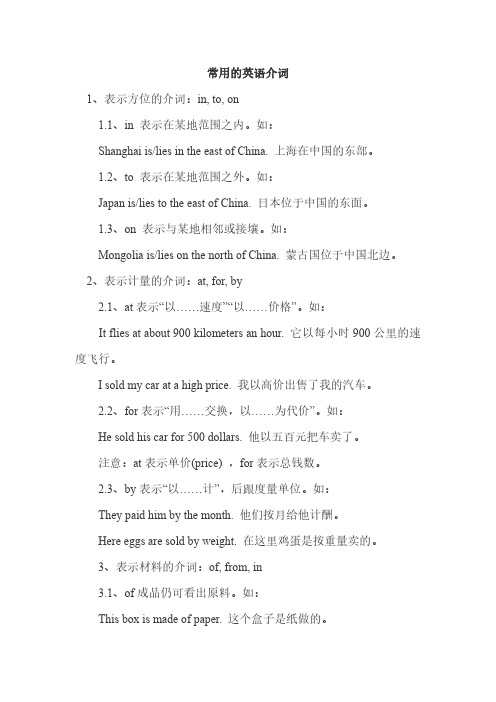
常用的英语介词1、表示方位的介词:in,to,on1.1、in表示在某地范围之内。
如:Shanghai is/lies in the east of China.上海在中国的东部。
1.2、to表示在某地范围之外。
如:Japan is/lies to the east of China.日本位于中国的东面。
1.3、on表示与某地相邻或接壤。
如:Mongolia is/lies on the north of China.蒙古国位于中国北边。
2、表示计量的介词:at,for,by2.1、at表示“以……速度”“以……价格”。
如:It flies at about900kilometers an hour.它以每小时900公里的速度飞行。
I sold my car at a high price.我以高价出售了我的汽车。
2.2、for表示“用……交换,以……为代价”。
如:He sold his car for500dollars.他以五百元把车卖了。
注意:at表示单价(price),for表示总钱数。
2.3、by表示“以……计”,后跟度量单位。
如:They paid him by the month.他们按月给他计酬。
Here eggs are sold by weight.在这里鸡蛋是按重量卖的。
3、表示材料的介词:of,from,in3.1、of成品仍可看出原料。
如:This box is made of paper.这个盒子是纸做的。
3.2、from成品已看不出原料。
如:Wine is made from grapes.葡萄酒是葡萄酿成的。
3.3、in表示用某种材料或语言。
如:Please fill in the form in pencil first.请先用铅笔填写这个表格。
They talk in English.他们用英语交谈。
注意:in指用材料,不用冠词;而with指用工具,要用冠词。
英语常用介词
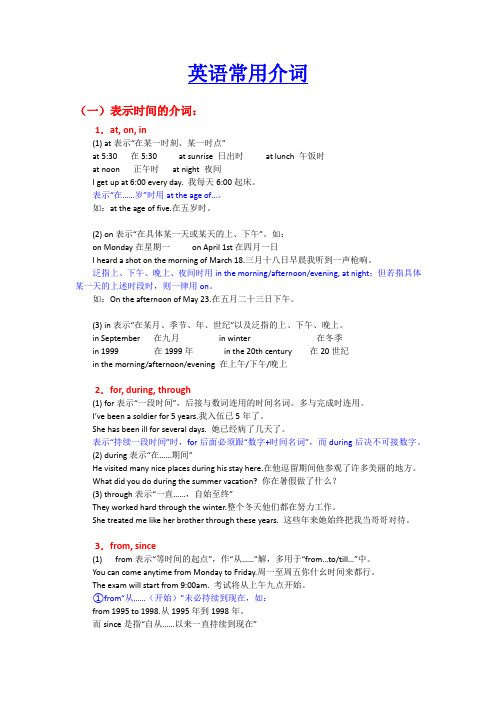
英语常用介词(一)表示时间的介词:1.at, on, in(1) at表示“在某一时刻、某一时点”at 5:30在5:30at sunrise 日出时at lunch 午饭时at noon正午时at night 夜间I get up at 6:00 every day. 我每天6:00起床。
表示“在……岁”时用at the age of…。
如:at the age of five.在五岁时。
(2) on表示“在具体某一天或某天的上、下午”。
如:on Monday在星期一on April 1st在四月一日I heard a shot on the morning of March 18.三月十八日早晨我听到一声枪响。
泛指上、下午、晚上、夜间时用in the morning/afternoon/evening, at night;但若指具体某一天的上述时段时,则一律用on。
如:On the afternoon of May 23.在五月二十三日下午。
(3) in表示“在某月、季节、年、世纪”以及泛指的上、下午、晚上。
in September在九月in winter在冬季in 1999 在1999年in the 20th century在20世纪in the morning/afternoon/evening 在上午/下午/晚上2.for, during, through(1) for表示“一段时间”,后接与数词连用的时间名词。
多与完成时连用。
I’ve been a soldier for 5 years.我入伍已5年了。
She has been ill for several days. 她已经病了几天了。
表示“持续一段时间”时,for后面必须跟“数字+时间名词”,而during后决不可接数字。
(2) during表示“在……期间”He visited many nice places during his stay here.在他逗留期间他参观了许多美丽的地方。
2023新人教版高中英语必修第三册介词表

2023新人教版高中英语必修第三册介词表本文档旨在提供2023新人教版高中英语必修第三册中所涉及的常用介词及其用法,以帮助学生更好地理解和掌握课本内容。
1. 介词的作用介词是英语中的一类虚词,常常用于引导名词、代词或动词短语等与其他词语之间的关系。
通过正确使用介词,可以明确表达出时间、地点、原因、方式等各种关系。
2. 常用介词表下面是2023新人教版高中英语必修第三册中常用的介词及其用法:1. about - 关于- We had a discussion about the new project.2. above - 在...上方- The airplane flew above the clouds.3. across - 横过- They walked across the bridge to reach the other side.4. after - 在...之后- Let's meet for coffee after class.5. against - 逆着- He leaned against the wall and waited for the bus.6. among - 在...之间- The prize was shared among the top three contestants.7. around - 在...周围- We took a walk around the park in the evening.8. before - 在...之前- Please submit your assignment before Friday.9. behind - 在...后面- The car stopped behind the red traffic light.10. below - 在...下方- The book is placed below the notebook on the shelf.11. beside - 在...旁边- She sat beside her best friend during the movie.12. between - 在...之间- The river flows between the two mountains.13. beyond - 超过;在...那边- The view from the balcony stretches far beyond the city.14. by - 通过;靠近- The information was delivered by email.- The school is located by the river.15. from - 自...起;从...起- He has been working from home for a month. - The train departs from the station at 9 am.16. in - 在...里;在...中- The cat is hiding in the box.- I found the key in my pocket.17. into - 进入- The horse jumped into the river.18. of - 属于- This is a photo of my family.19. off - 离开- The train station is just off the main road.20. on - 在...上- The book is on the table.21. over - 在...上方;越过- The plane flew over the mountains.- He climbed over the fence to enter the garden.22. through - 穿过- We walked through the forest to get to the lake.23. to - 到;向- I went to the store to buy some groceries.24. under - 在...下(方)- The cat is sleeping under the bed.25. with - 用;随着- He cut the cake with a knife.- She walked into the room with a smile.请注意,以上仅是一部分常用的介词,仅供参考。
- 1、下载文档前请自行甄别文档内容的完整性,平台不提供额外的编辑、内容补充、找答案等附加服务。
- 2、"仅部分预览"的文档,不可在线预览部分如存在完整性等问题,可反馈申请退款(可完整预览的文档不适用该条件!)。
- 3、如文档侵犯您的权益,请联系客服反馈,我们会尽快为您处理(人工客服工作时间:9:00-18:30)。
介词
介词
In; on, at; after, until; before;during; by; to; for;between ;with; about;from
页脚内容1
页脚内容2
页脚内容3
页脚内容4
页脚内容5
页脚内容6
页脚内容7
durin g during表示在...期间内during my visit to China
during the travel to the
south
during the Middle Ages
during his childhood
during my holidays
1 - Thank you ___the beautiful flowers!
- Not at all.
A in
B on
C at
D for
2 Can you answer this question ___English?
A by
B in
C with
D from
3 Look ___the map ___China ___the wall, please.
A.after, of, in
B.at, of, in
C.after, in, on
D.at, of, on
页脚内容8
4 - When did Mr Green arrive in London?
- He arrived there ___the evening of December 6th.
A at 4
B in
C on
D to
5 We won the relay race. And there was a big smile ___our teacher's face.
A off
B near
C on
D between
6 The twins got on well ___their classmates.
A.to B in C with D about
7 - Please remember to come to my birthday party.
- I see. I'll come ___Saturday evening.
A in
B at
C on
D for
8.Let's hurry,or we'll be late ___school
A to
B at
C with
D for
9.They will have a maths test ___two days
A.for B at C in D after
10.My brother joined the army ___
A.1989,March
B.in March,1989
C.March,1989
D.1989,in March
页脚内容9
11.He couldn't work out the maths problem ___your help
A.without
B.under
C.for
D.with
12.Granny took one look at us ___her glasses
A.by
B.through
C.on
D.in
13.We had our breakfast ___a quarter ___seven
A./,to
B.in,to
C.at,to
D.on,to
14.I learn French ___the radio every day
A.on
B.in
C.from
D.at
15.It's good manners to wait ___line
A.in
B.on
C.at
D.with
16.How many English words had you learnt ___last term?
A.by the end of
B.at the end of
C.to the end of
D.till the end of 17.The manager was very satisfied ___his work
A.in
B.on
C.about
D.with
18.John hit Jack ___face
A.on the
B.in the
C.on his
D.in his
19.I was born ___the night ___September 15,1978
页脚内容10
A.in,on
B.at,on
C.at,in
D.on,of
20.It's a bad manner to laugh ___people when they are ___trouble
A. over,in
B.at,in
C.in,at
D.at,for
21.I can't do this work well ___Tom's help
A.under
B.for
C.without
D.from
22.Don't shout ___the old woman 。
You should be more polite ___her
A.to,at
B.at,to
C.in,for
D.from,for
23We must be strict ___our selves ___everything
A.with,in
B.in,with
C.with,to
D.to,of
24.He went to the football match ___lunch last Sunday
A.to
B.without
C.behind
D.between
25. The people's Republic of China was founded ___1949
A.with
B.on
C.since
D.in
26.Mr Black got to Hangzhou ___a few days
A.in
B.after
C.on
D.at
27. - Has the teacher given you any advice ___your English study?
- Yes,he has
页脚内容11
A.from
B.with
C.on
D.in
28.You may depend ___him He is ___honest man
A.on,a
B.in,an
C.on,an
D.at,the
29 ___my joy,I can answer this question.
A.With
B.To
C.By
D.For
30.The teacher asked the students to look ___the word in the dictionary
A.for
B.at
C.up
D.after
31. A little monkey is playing ___a tree and there are a lot of bananas ___it
A.on,on
B.in,on
C.on,in
D.in,in
32.I go to school ___bus every morning.
A. in
B. by
C. on
D. at
33. No one likes a person ___bad manners.
A. without
B. on
C. out of
D. with
34 The policeman was surprised ___the news.
A. into
B. for
C. at
D. out of
35 He had to sell newspapers ___seven.
A. at an age of
B. at the ages of
C. at the age of
D. at age of
页脚内容12
36 The little girl couldn't help ___when she saw a large dog.
A. cried
B. to cry
C. crying
D. cries
37 Jack was born ___March 1st, 1978.
A. on
B. in
C. at
D. of
38 Edison was very interested ___science when he was a boy.
A. to
B. on
C. in
D. about
39 The teacher was very satisfied ___her answer.
A. in
B. on
C. for
D. with
40 The story happened ___Beijing.
A. in
B. with
C. for
D. on
页脚内容13。
